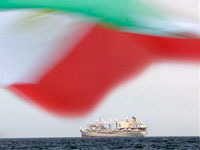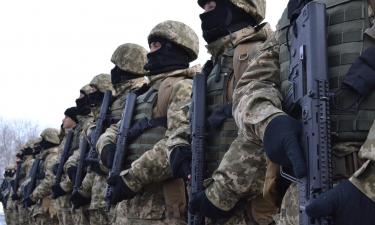Iran tries to frighten USA with its outdated navy vessels
 Iran will send Navy vessels to the US to build up an open sea presence along the East Coast. "Just like the global hegemony that is present near our marine borders, we ... also plan to establish a strong presence near U.S. marine borders," Iranian Navy Commander Habibollah Sayyari said, according to Iran's state news agency.
Iran will send Navy vessels to the US to build up an open sea presence along the East Coast. "Just like the global hegemony that is present near our marine borders, we ... also plan to establish a strong presence near U.S. marine borders," Iranian Navy Commander Habibollah Sayyari said, according to Iran's state news agency.
The West obviously took the statement as a provocation. However, Iran has a full right to send its vessels to the US coast. The appearance of Iranian Navy vessels near the USA will become Iran's response to the actions of US Armed Forces in the Persian Gulf, near the borders of Iran.
It would be enough to say that there are American bases in Bahrain and Saudi Arabia. Iran is also concerned about the fact that a part of US troops will be redeployed from Iraq to Kuwait. A French army base appeared in the United Arab Emirates in 2010. Therefore, one shall assume that Iran has decided to act accordingly.
Is the Iranian administration serious this time? Technically, Teheran can indeed send a group of its Navy vessels across the Atlantic. The question with their deployment can be solved too. Since it goes about the East Coast, it appears that Iran may find a base in Venezuela.
However, Iran simply cannot send a large group of its vessels too far away. Iran does not have spare military ships, and the country has to keep an eye on Syria.
In the beginning of 2011, Teheran sent its fleet to the Red and the Mediterranean seas. The move was supposed to demonstrate Iran's growing military power to the West. Iran wanted to show that it was capable of blocking the route, which the West uses for the transportation of oil from the country of the Persian Gulf.
Iran can only send several vessels to America. There are approximately 25,000 people serving in the Iranian Navy, and only 16,000 serve in the Naval Force. According to Iranian media, the Islamic Republic has five destroyers, three frigates, two corvettes, 13 diesel-powered submarines and a dozen of missile boats. Most of those vessels are either outdated or unadapted for long-distance journeys in the ocean. Many of those vessels are upgraded versions of old Soviet or even older British ships. It goes without saying that Iran is simply unable to challenge the USA at sea.
It is worthy of note that the Iranian official released the above-mentioned statement during a ceremony devoted to the beginning of the Iranian-Iraqi war. Iran managed to repel the Iraqi aggression, but it failed to defeat Saddam Hussein, who used to enjoy the support of the West.
Iran suffered colossal human and financial losses from 1980 to 1998 - up to 900,000 people and $500 billion. It took the Islamic Republic many years to stand up on its feet. Teheran does not blame Saddam Hussein for everything. Iranian officials realize that the West used Iraq against Iran and orchestrated the Iraqi aggression against the country.
Iran's role of a regional superpower has been growing. The country's ambitions in the strategically important region for the West have been growing as well. The USA and its allies stopped Iran during the 1980s. They do not have this opportunity today. The West could now use Turkey instead of Iraq, though.
Sergei Balmasov
Pravda.Ru
Subscribe to Pravda.Ru Telegram channel, Facebook, RSS!




